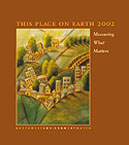Search Results
-
Weight Watch
This fascinating article in Harvard Magazine summarizes some of the latest research on obesity and inactivity-one of the most important health trends of the decade in Cascadia. (Check if you’re too heavy on the calculator here.) Some snippets to convince you to read it: Two-thirds of American adults are overweight, and half of these are obese. . . [and] up to 80 percent of American adults should weigh less than...Read more » -
The Price of the Next Trip
Gasoline prices are at their highest in recent memory and they appear likely to stay high for months. Is this a dream come true for climate defenders and transportation reformers? Far from it. Short-term price spikes, such as the one we’re enduring now, have surprisingly little impact on driver behavior. But they constitute a massive drain on the economies of fuel-importing regions such as ours. And they enrich oil companies,...Read more » -
Getting Warmer . . .
The three West Coast governors-Arnold Shwarzenegger of California, Ted Kulongoski of Oregon, and Gary Locke of Washington—are moving forward with a global warming initiative first initialed by ex-governor Gray Davis of California. And their policy advisors have assembled a first batch of plans for public comment. Read and comment here. Unfortunately, boldness is largely absent from the first draft. The proposals are modest gestures like buying hybrid cars for state...Read more » -
Fueling Pump Rage
Motor fuel prices in Cascadia keep rising. BC premier Gordon Campbell says to blame Canadian Prime Minister Paul Martin for the bite it’s taking out of British Columbians’ bank accounts. Fuel prices in Vancouver reached about 95 (Canadian) cents a litre yesterday, approaching the psychologically important dollar-a-litre level. Just so, gasoline prices in the Northwest states have inched toward the $2 a gallon mark. (Yours truly discusses these matters on...Read more » -
This Place on Earth 2002 Excerpt
“This Place on Earth 2002” looks at the region’s progress in sustainability by assessing trends in ten key areas, from salmon health and spread of sprawl to income distribution and energy efficiency. This excerpt from the introduction explains the need for such alternatives to traditional gauges.Read more »



